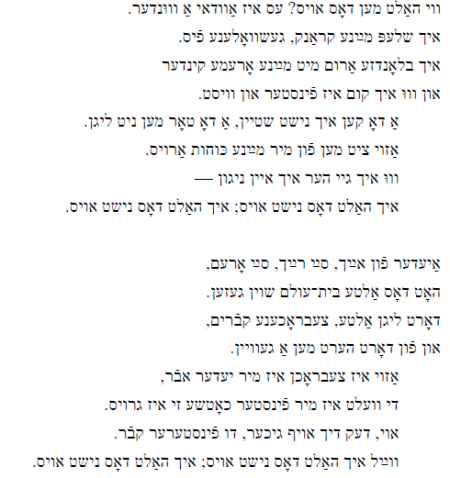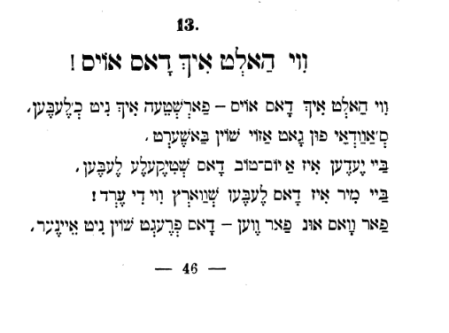Az in droysn geyt a reygn vern di shteyner nas
When It Rains Outside the Stones Get Wet
Sung by Beyle Schaechter-Gottesman and Lifshe Schaechter-Widman
BSG recorded by Itzik Gottesman, Bronx, 1980s; LSW recorded by Leybl Kahn 1954.
Commentary by Itzik Gottesman
Beyle Schaechter-Gottesman (BSG) learned this lyrical love song from her mother Lifshe Schaechter-Widman (LSW), and LSW probably learned it in her hometown of Zvinyetshke, Bukovina. At this “zingeray” (song sharing session) in the Gottesman home, one can hear other singers featured on “Yiddish Song of the Week” – Tsunye Rymer and Ita Taub – joining in:
Leybl Kahn had years earlier recorded LSW singing the same song; so we have a rare opportunity to compare the singing of the same song by mother and daughter:
In this performance BSG leaves out the second verse which she usually included. LSW does include that verse. I have transcribed and translated both versions though they are very similar.
Both versions have the wonderful rhyme of “khipe” (wedding canopy) with “klipe” (shrew or an evil spirit that won’t leave you alone).

Painting by Beyle Schaechter-Gottesman
A recording of BSG singing this song with all the verses appears on the CD “Bay mayn mames shtibele” (At My Mother’s House, 2004) with violin accompaniment by Alicia Svigals
At the beginning and end of the LSW recording the collector Leybl Kahn sounds confused because LSW had just sung for him another song beginning with the same line “Az in droysn geyt a reygn”.
BSG TRANSLITERATION
Az in droysn geyt a reygn,
vern di shteyndelekh nas.
Un az a meydele shpilt a libe
vern ire bekelekh blas.
Second verse that she left out:
Un az zi shpilt shoyn oys di libe
farlirt zi dokh ire farbn.
Un az zi shpilt nisht oys di libe,
miz zi dokh yingerheyt shtarbn]
Vos dreysti dikh mame far mayne oygn?
Dreyst dekh nor vi a klipe.
Kh’vel mit im avekforn in an anderer medine
un vel mit im shteln a khipe.
Oy, un a shadkhn, oy vey iz der mamen,
vet ir zikh beyde nemen?
Say ez vet dir git geyn, say es vet dir shlekht geyn –
far keyn kind vil ekh dikh mer nisht kenen.
Az in droysn geyt a reygn,
vern di shteyndelekh nas.
Un az a meydele shpilt a libe
vern ire bekelekh blas.
BSG TRANSLATION
Outside, when it rains
the stones get wet.
And when a girl falls in love
her cheeks get pale.
Second verse that she left out:
And if the love is successful
she loses her colors.
And if the love is unrequited
then she must die
Why are you always before my eyes, mother.
You’re clinging to me like an evil spirit.
I will run away with him to a foreign land
and marry him under a canopy.
“Without a matchmaker, woe is to your mother,
you will take each other?
I don’t care if things go well, or bad with you.
I will no longer consider you as my child”
Outside, when it rains
the stones get wet.
And when a girl falls in love
her cheeks get pale.
LSW VERSION TRANSLITERATION
Az in droysn geyt a reygn
vern di shteyndelekh nas.
In az a meydele shpilt a libe
vern ir di bekelekh blas.
In az zi shpilt di libe
vert zi dokh un di farbn
In az zi shpilt nisht oys di libe
miz zi dekh yingerheyt shtarbn.
Vus dreysti dikh, mametshkele, far mayne oygn.
Di dreyst dekh arim vi a klipe.
Ikh vel mit im avekfurn in a fremder medine
un vel mit im shteln a khipe.
Un a shadkhn oy vey iz der mame
vet ir aykh beyde nemen.
Say es vet aykh git zayn, say ez vet aykh shlekht zan
Far keyn kind, vil ikh dekh mer nit kenen.
Say es vet aykh git zayn, say ez vet aykh shlekht zayn
Far keyn kind, vil ikh dekh mer nit kenen.
Say es vet dir git zayn, say ez vet aykh shlekht zayn
Far keyn kind, vil ikh dekh mer nit kenen.
LSW TRANSLATION
Outside, when it rains
the stones get wet.
And when a girl has a love
her cheeks get pale.
And if the love is successful
she loses her colors.
and if the love unrequited
then she must die
Why are you always before my eyes, mother.
You’re clinging to me like an evil spirit.
I will run away with him to a foreign land
and marry him under a canopy.
“Without a matchmaker, woe is to your mother,
you will take each other?
I don’t care if things go well, or bad with you.
I will no longer consider you as my child”







 Zvinyetchke (Zwiniacza), Bukovina (now Ukraine),
Zvinyetchke (Zwiniacza), Bukovina (now Ukraine), 
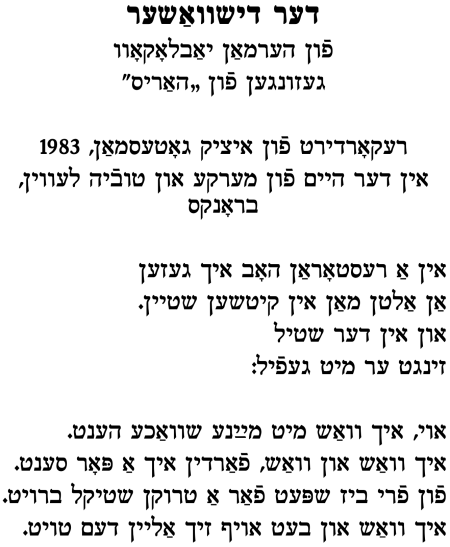





 “Rebecca at the Well”, painting by Corot, 1839
“Rebecca at the Well”, painting by Corot, 1839

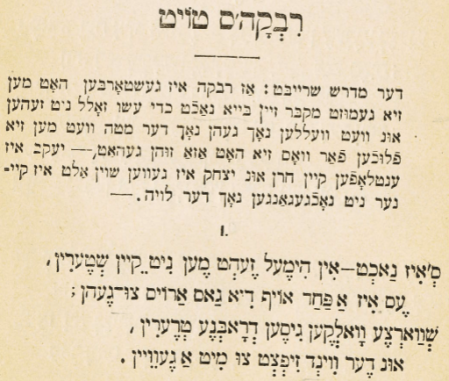

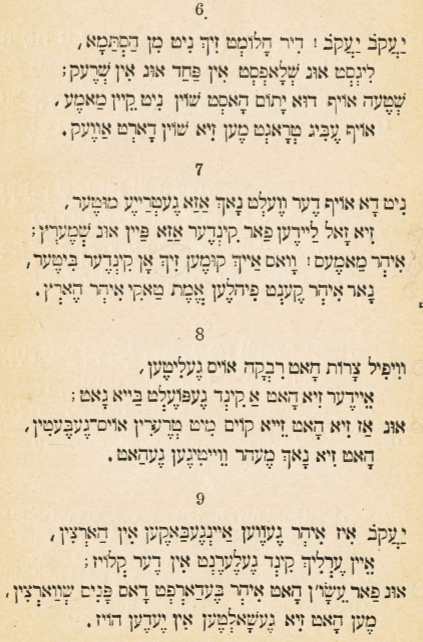



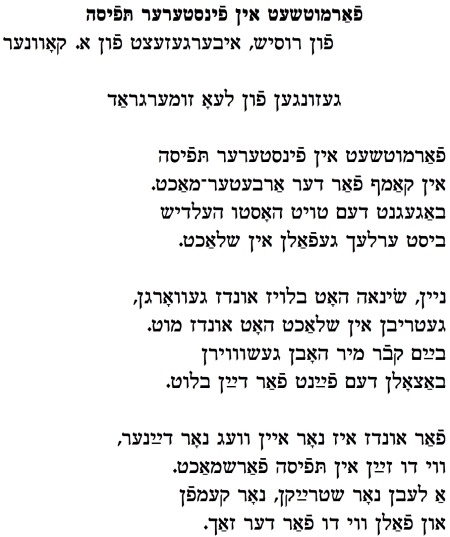

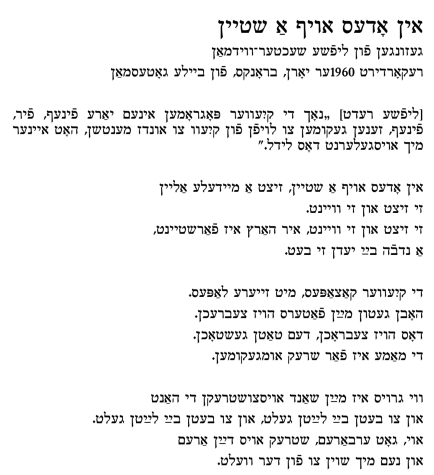


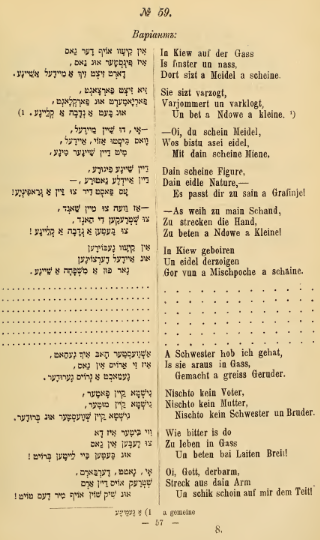




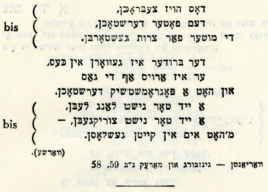
 Mark Varshavski in Berdichev, 1900 (YIVO)
Mark Varshavski in Berdichev, 1900 (YIVO)
